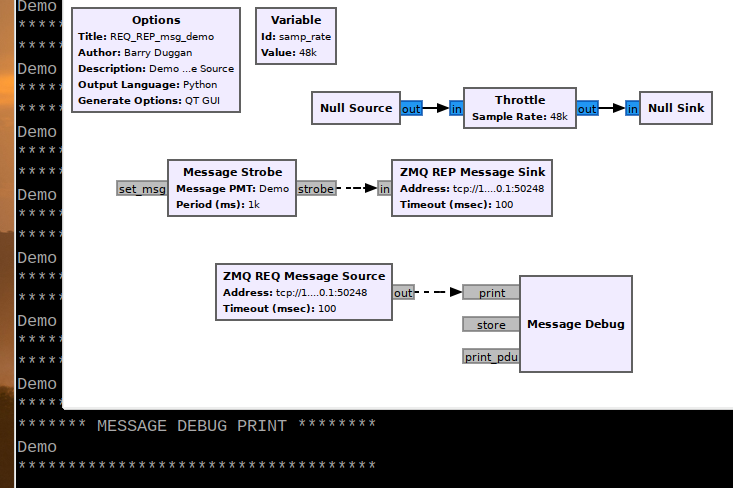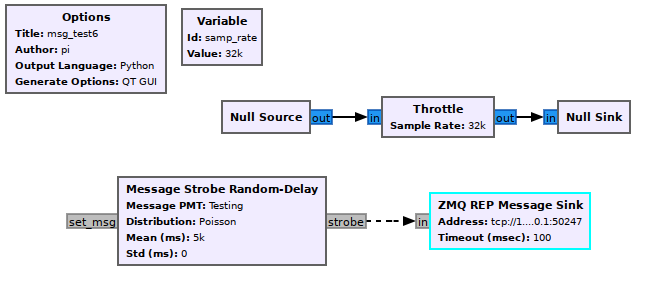ZMQ REP Message Sink: Difference between revisions
(rewording opening section) |
(add example flowgraph and Python code) |
||
| Line 14: | Line 14: | ||
== Example Flowgraph == | == Example Flowgraph == | ||
=== Inter-flowgraph === | |||
Request/Reply pairs can be used on one, or two separate, flowgraphs to exchange messages.<br> | |||
[[File:REQ_REP_msg_demo_fg.png]] | [[File:REQ_REP_msg_demo_fg.png]] | ||
=== External Python client (receive only) === | |||
An external Python program can receive messages from a ZMQ REP Message Sink block. An example flowgraph and Python code follow.<br> | |||
[[File:Msg_test6_fg.png]] | |||
The Python client code looks like this:<br> | |||
<pre> | |||
#!/usr/bin/env python3 | |||
# -*- coding: utf-8 -*- | |||
# The REQest / REPly nomenclature of the GNU Radio message blocks is from | |||
# the perspective of the flowgraph. So, to send a 'request' to GNU Radio, the message | |||
# must be sent as a 'reply' from the Python client, Likewise, a 'reply' from GNU Radio | |||
# must be received as a 'request' to the Python client! Therefore, send on the reply socket | |||
# and receive on the request socket. | |||
# | |||
# The zeromq.org website says: | |||
# "The REQ-REP socket pair is in lockstep. The client issues zmq_send() and then zmq_recv(), | |||
# in a loop (or once if that's all it needs). Doing any other sequence (e.g., sending two messages in a row) | |||
# will result in a return code of -1 from the send or recv call." Likewise, the server "issues zmq_recv() | |||
# and then zmq_send() in that order, as often as it needs to." | |||
# | |||
# To conform to that requirement, a non-standard "kludge" is used (see below). | |||
import zmq | |||
import pmt | |||
def main(): | |||
zmq_context = zmq.Context() | |||
zmq_sock = zmq_context.socket(zmq.REQ) | |||
zmq_sock.connect("tcp://127.0.0.1:50247") | |||
while(True): | |||
zmq_sock.send_string("\x01\x00\x00\x00") # this is the non-standard "kludge" | |||
msg = zmq_sock.recv() | |||
print (pmt.to_python(pmt.deserialize_str(msg))) | |||
if __name__ == '__main__': | |||
main() | |||
</pre> | |||
=== External Python server === | |||
== Source Files == | == Source Files == | ||
Revision as of 13:35, 13 March 2020
The ZMQ REP Message Sink block receives async messages and sends them to a ZMQ REP socket. This block will connect to a ZMQ REQ Message Source.
The zeromq.org website says:
"The REQ-REP socket pair is in lockstep. The client issues zmq_send() and then zmq_recv(), in a loop (or once if that's all it needs). Doing any other sequence (e.g., sending two messages in a row) will result in a return code of -1 from the send or recv call." Likewise, the server "issues zmq_recv() and then zmq_send() in that order, as often as it needs to."
Parameters
(R): Run-time adjustable
- Address
- ZMQ socket address specifier. The format of the address is
tcp://*:portwhere * should be 127.0.0.1 for localhost.
- Timeout
- Socket timeout in milliseconds, default is 100ms.
Example Flowgraph
Inter-flowgraph
Request/Reply pairs can be used on one, or two separate, flowgraphs to exchange messages.
External Python client (receive only)
An external Python program can receive messages from a ZMQ REP Message Sink block. An example flowgraph and Python code follow.
The Python client code looks like this:
#!/usr/bin/env python3
# -*- coding: utf-8 -*-
# The REQest / REPly nomenclature of the GNU Radio message blocks is from
# the perspective of the flowgraph. So, to send a 'request' to GNU Radio, the message
# must be sent as a 'reply' from the Python client, Likewise, a 'reply' from GNU Radio
# must be received as a 'request' to the Python client! Therefore, send on the reply socket
# and receive on the request socket.
#
# The zeromq.org website says:
# "The REQ-REP socket pair is in lockstep. The client issues zmq_send() and then zmq_recv(),
# in a loop (or once if that's all it needs). Doing any other sequence (e.g., sending two messages in a row)
# will result in a return code of -1 from the send or recv call." Likewise, the server "issues zmq_recv()
# and then zmq_send() in that order, as often as it needs to."
#
# To conform to that requirement, a non-standard "kludge" is used (see below).
import zmq
import pmt
def main():
zmq_context = zmq.Context()
zmq_sock = zmq_context.socket(zmq.REQ)
zmq_sock.connect("tcp://127.0.0.1:50247")
while(True):
zmq_sock.send_string("\x01\x00\x00\x00") # this is the non-standard "kludge"
msg = zmq_sock.recv()
print (pmt.to_python(pmt.deserialize_str(msg)))
if __name__ == '__main__':
main()
External Python server
Source Files
- C++ files
- TODO
- Header files
- TODO
- Public header files
- TODO
- Block definition
- TODO

